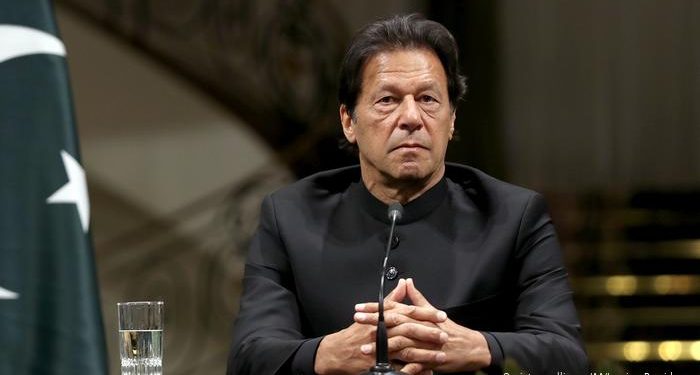Karachi: Pakista’s struggling textile industry has voiced its disappointment after the Imran Khan government rejected a proposal to import cotton from India, the world’s biggest producer, saying it is the need of the hour to avoid a massive slump in the country’s exports.
The federal Cabinet headed by Prime Minister Khan on Thursday rejected the proposal of a high-powered committee to import cotton from India, with Foreign Minister Shah Mahmood Qureshi asserting that there can be no normalisation of ties until New Delhi reverses its decision in 2019 to revoke the special status of Jammu and Kashmir.
The Cabinet’s decision has disappointed the textile export industry, the Dawn newspaper quoted Pakistan Apparel Forum chairman Jawed Bilwani as saying.
The textile export sector, which was already under pressure due to the COVID-19 pandemic, has been continuously demanding duty-free import of cotton yarn from all over the world, including India, to avert any big loss to textile exports.
Describing Commerce Adviser Abdul Razak Dawood’s recommendation to allow import of cotton and cotton yarn from India as realistic and the need of the hour, Bilwani said that the Cabinet must give serious consideration to the proposal.
The step would send a negative message to foreign buyers as cotton yarn was not available in the country, he said, adding that prices of cotton yarn have increased after the Cabinet’s decision.
“The government must ensure availability of cotton yarn if it did not want to allow its import from India,” Bilwani said as he feared massive textile export decline if import of cotton yarn from India was not allowed.
In the current year, Pakistan faced a 40 per cent plunge in cotton production and if it was compared with 15 million bales in 2014-2015, then the drop was 50 per cent this year, he said.
“If the government did not want to permit import of cotton yarn from India then it must impose a ban on export of cotton and cotton yarn for at least next six months,” he added.
Pakistan’s U-turn on Thursday came a day after the Economic Coordination Committee (ECC), under newly-appointed Finance Minister Hammad Azhar, recommended importing cotton and sugar from India, lifting a nearly two-year long ban on its import from the neighbouring country amidst tensions over the Kashmir issue.
Speaking to The Express Tribune newspaper, Pakistan Readymade Garments Manufacturers and Exporters Association Patron-in-Chief Ijaz Khokhar said the entire value-added sector was shocked by the way the government reversed its decision.
Reacting to the Pakistan Cabinet’s refusal to allow import of cotton yarn from India, he said they are planning a protest in the coming days.
“According to the World Trade Organisation laws, no one can object to trade with another country, the restrictions imposed by Pakistan on trade with India are based on political grounds, but if we allow imports of medicines from India, then why not cotton yarn,” Khokhar said.
“This step shows that mafias are still part of the government and this impression will reach our international buyers,” he said, adding, “We now fear that this step will help a certain part of the textile sector whereas the rest will lose orders as buyers will prefer India and Bangladesh over Pakistan due to such steps.”
Pakistan Hosiery Manufacturers and Exporters Association Zonal Chairman Faisal Mehboob said his organisation has urged the government to make bold decisions, which were vital for a smooth running of the industry.
Mehboob said that any decision to lift the ban on import of cotton and yarn from India would greatly support country’s value-added knitwear sector, besides contributing to stabilising the national economy through an increase in exports.
But former All Pakistan Textile Mills Association chairman Shahzad Ali Khan said that restricting yarn imports from India was a good decision.
“Yarn imports could have pitted Pakistan’s spinning sector against the Indian counterparts and since the Indian industry is getting subsidised energy, the local industry would have been affected,” he claimed.
India is the world’s largest cotton producer and the second-largest exporter. India’s cotton exports jumped over 40 per cent to 10 million bales (of 170 kg each) in the 2018-19 marketing year on strong overseas demand.
The ECC’s decision had raised hopes of a partial revival of Pakistan-India bilateral trade relations, which were suspended after the August 5, 2019 decision of New Delhi to revoke the special status of Jammu and Kashmir.
In May 2020, Pakistan lifted the ban on import of medicines and raw material of essential drugs from India amidst the COVID-19 pandemic.
Bilateral ties nose-dived after a terror attack on the Pathankot Air Force base in 2016 by terror groups based in Pakistan. Subsequent attacks, including one on an Indian Army camp in Uri, further deteriorated the relations.
The ties strained further after India’s war planes pounded a Jaish-e-Mohammed terrorist training camp in Pakistan in February 2019 in response to the Pulwama attack in 2019 in which 40 CRPF jawans were killed.
India’s move to revoke the special status of Jammu and Kashmir in 2019 angered Pakistan, which downgraded diplomatic ties and expelled the Indian High Commissioner in Islamabad. Pakistan also snapped all air and land links with India and suspended trade and railway services.
PTI






































